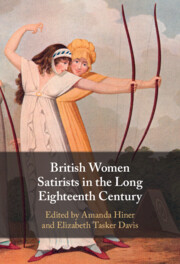Book contents
- British Women Satirists in the Long Eighteenth Century
- British Women Satirists in the Long Eighteenth Century
- Copyright page
- Dedication
- Contents
- Illustrations
- Notes on Contributors
- Acknowledgements
- Introduction
- Part I Traditions and Breaks
- Part II Publicity and Print Culture
- Part III Moral Debates and Satiric Dialogue
- Chapter 10 Anne Finch, Anna Seward, and Women’s Relation to Formal Verse Satire in the Long Eighteenth Century
- Chapter 11 Satire as Gossip
- Chapter 12 “An invisible Spy”
- Chapter 13 Austen’s Menippean Experiments
- Appendix Selected List of Eighteenth-Century Women Writers and Their Satiric Works
- Selected Bibliography and Guide to Further Reading
- Index
Chapter 13 - Austen’s Menippean Experiments
Paternalism and Empire in the Juvenilia and Mansfield Park
from Part III - Moral Debates and Satiric Dialogue
Published online by Cambridge University Press: 31 March 2022
- British Women Satirists in the Long Eighteenth Century
- British Women Satirists in the Long Eighteenth Century
- Copyright page
- Dedication
- Contents
- Illustrations
- Notes on Contributors
- Acknowledgements
- Introduction
- Part I Traditions and Breaks
- Part II Publicity and Print Culture
- Part III Moral Debates and Satiric Dialogue
- Chapter 10 Anne Finch, Anna Seward, and Women’s Relation to Formal Verse Satire in the Long Eighteenth Century
- Chapter 11 Satire as Gossip
- Chapter 12 “An invisible Spy”
- Chapter 13 Austen’s Menippean Experiments
- Appendix Selected List of Eighteenth-Century Women Writers and Their Satiric Works
- Selected Bibliography and Guide to Further Reading
- Index
Summary
This essay argues that reading works from Jane Austen’s juvenilia alongside Mansfield Park reveals the author’s decades-long engagement in a series of formal experiments traditionally associated with Menippean satire, a strategy she uses to reveal the oppressive nature of British paternalism while still aligning with societal expectations for women authors. “Henry and Eliza” and “Evelyn” lampoon and critique traditional tropes of the popular novel and expose the landed gentry’s and the aristocracy’s proto-capitalist abuses of women, workers, and the poor. Longer (and later) works, “Catharine, or the Bower” and Mansfield Park, expand this emphasis to register anxieties about Britain’s imperial violence at home and abroad. The essay ultimately suggests that Austen’s notoriously tonally opaque novel targets the Evangelical novel as the form most suitable to expose broader British ambivalence toward abolition and emancipation.
Keywords
- Type
- Chapter
- Information
- British Women Satirists in the Long Eighteenth Century , pp. 244 - 261Publisher: Cambridge University PressPrint publication year: 2022

